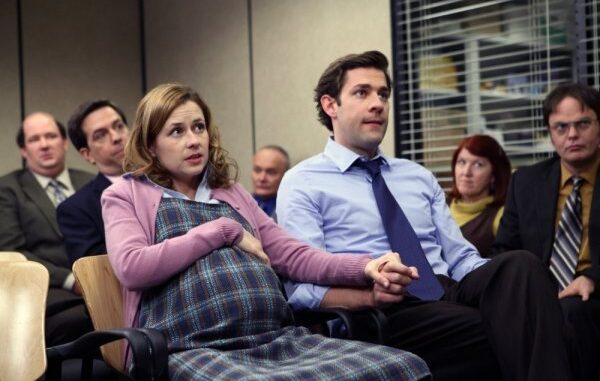
The Unraveling Laughter in Dunder Mifflin’s Delivery Room
The Office holds a unique, cherished place in the pantheon of television comedy, a mockumentary masterpiece that blurred the lines between scripted hilarity and the authentic, often awkward, human experience. Part of its enduring charm lay not just in its meticulously crafted characters and storylines, but in the palpable, almost infectious, joy that emanated from its cast. Nowhere was this more evident, or more hysterically disarming, than during the long-awaited birth of Pam and Jim Halpert’s first child, Cecelia, in the two-part episode aptly titled “Delivery.” It was a scene so steeped in the show’s signature blend of absurdity and heart that, for the actors involved, maintaining professional composure became an exercise in futility. The Office cast, in essence, could not hold it together, and in their delightful unraveling, they gave us some of the show’s most genuinely iconic moments.
From its very inception, The Office thrived on improvisation and the unscripted reactions of its ensemble. The mockumentary style inherently invited actors to embody their characters so thoroughly that moments of genuine surprise or suppressed laughter were not just permitted but often celebrated. Bloopers reels from the show are legendary, largely featuring Steve Carell (Michael Scott) as the primary instigator of breaking character, but the "Delivery" episode presented a perfect storm of elements designed to shatter even the most seasoned comedic actor’s resolve. The high stakes of a birth, coupled with Michael’s desperate need to be central to every significant event, and Dwight’s unwavering, bizarre “help,” created a pressure cooker of humor that was simply too much for human beings to withstand.
At the epicenter of the chaos, as always, was Michael Scott, a character whose social ineptitude and unwavering self-importance were his greatest comedic assets. In the sterile, yet surprisingly chaotic, environment of the hospital birthing suite, Michael found myriad ways to make the situation insufferable for Jim, agonizing for Pam, and utterly hilarious for the audience – and, evidently, for the cast. His off-color jokes, his attempts to entertain Pam with inappropriate sound effects ("Push it out, Michael!"), and his insistence on calling Jan Levinson for advice on childbirth were delivered with Carell’s inimitable deadpan earnestness. Carell’s commitment to Michael’s ludicrous reality was so absolute that it often became a challenge for his co-stars to maintain their own character's appropriate reactions. John Krasinski, whose Jim was often the audience’s relatable straight man, can be seen in various outtakes visibly biting his lip, trying to hide a laugh, or simply looking away to regain composure. The sheer audacity of Michael’s obliviousness was a constant, delightful assault on the actors’ professionalism.
Adding another layer of impenetrable absurdity was Dwight Schrute, the beet farmer and assistant (to the) regional manager whose unique brand of "helpfulness" consistently bordered on the surreal. While Michael was the agent of inappropriate chaos, Dwight was the embodiment of unsettling, misinformed order. His detailed, though entirely unhelpful, birthing plan, his offer to apply various "remedies" from his farm, and his unwavering dedication to Pam's "comfort" (which included sitting on a birthing ball that she needed) were pure gold. Rainn Wilson’s genius lay in his ability to deliver these lines with such solemn conviction that it amplified the humor to an almost unbearable degree. When Dwight, ever the pragmatist, suggests that Pam simply "push out the baby, don't worry about the pain," the reactions, especially from Jenna Fischer (Pam), are so perfectly strained and exhausted that it’s clear the actors themselves were battling genuine amusement beneath the layers of their characters’ frustration. Fischer, who spent much of the scene in a state of simulated agony, had the unenviable task of reacting to these absurdities with pain-wracked exasperation, a feat made all the more challenging when the man across from her, Rainn Wilson, was delivering lines of pure, unadulterated Dwight.
The beauty of the cast’s inability to hold it together lies in what it signifies: the genuine camaraderie and affection that existed among them. These weren't merely co-workers; they were a tightly knit ensemble who had spent years building these characters and relationships. The laughter wasn’t unprofessionalism; it was an overflow of shared joy and a testament to the magic they were creating. When you see Steve Carell break into a giggle, or John Krasinski visibly struggle to keep a straight face, it transcends the fictional world of Dunder Mifflin and connects us directly to the human beings who brought those characters to life. It makes the show feel more authentic, more lived-in, and ultimately, more lovable. The bloopers from “Delivery” are not just discarded footage; they are essential viewing, showcasing the raw, infectious energy that permeated the set and translated directly into the beloved series.
In conclusion, the "Delivery" episode of The Office stands as a shining example of why the show resonated so deeply with audiences. The chaos of Pam’s birth scene, exacerbated by Michael’s inappropriate antics and Dwight’s bizarre interventions, pushed the cast to their absolute comedic limits. Their inability to maintain composure wasn't a flaw; it was a feature, a window into the genuine camaraderie and shared delight that defined the production. These moments of unraveling, of actors breaking character and sharing an unscripted laugh, are not just entertaining bloopers. They are integral threads in the rich tapestry of The Office, proving that sometimes, the most perfect performances are born from the beautiful, human struggle to hold it all together.